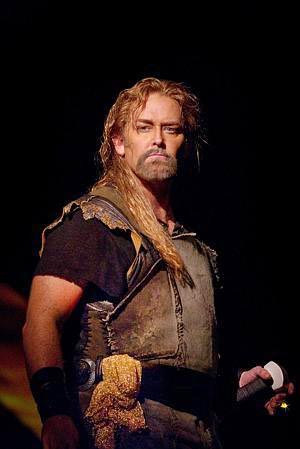 Is this man the thinking woman’s opera star? the most heroically proportioned tenor currently plying the world’s Wagner circuit? or is he the Siegfried that launched the Metropolitan Opera’s current Ring cycle to mega-YouTube status?
Is this man the thinking woman’s opera star? the most heroically proportioned tenor currently plying the world’s Wagner circuit? or is he the Siegfried that launched the Metropolitan Opera’s current Ring cycle to mega-YouTube status?
Yes, yes and yes! Jay Hunter Morris is a big blonde Texan with voice, looks and intelligence enough to command the final installments of Richard Wagner’s opulent transfiguration of northern mythology into cultural gold. Gold, as in the ring itself.
Easily the most compelling artistic argument against postmodernism, The Ring is a fable whose moment is exactly now. The quest for eternal youth, power, and fathomless wealth, is what drives the Wagnerian epic, and never have its tensions or tragedies been so eerily reflected in political reality as at this moment of the early 21st century. Just sit quietly with this for a minute.
The gold that lives in the Rhine river, the property of the industrious underworld of the Nibelungen, has been won through trickery by the king of the gods himself, Wotan. Well that plan goes wrong rather quickly, and it is up to a new, human hero to win back the ring and return it to its rightful owners. This is the part where Wotan’s strong-willed daughter Brünnhilde comes in.
Like many opera-lovers who haven’t the time, money or connections to enjoy the four-part “Ring” operas live at the Met, I happily shelled out a mere $20 bucks a piece to feast on the four HD simulcasts — the first two operas last year, and the final two operas, this year.
Glorious in every respect, the opera, its cast and its director grew over the course of the two years and by last Saturday—when Götterdämmerung brought the cycle, and Valhalla itself, to an end, every note, every disarming visual nuance, and even the voices themselves were all in place. My highest praise goes to the towering Morris, whose bright and flexible tenor proved a match even for the arduous, six-hour denouement.
In his physical glory—the voice, the face, the stunning athletic grace—he was everything Wagner could have wanted for his hero. When he sang, laughed, wept, and finally bled, he embodied the long-gone hope for a man whose heart and hands would be clean enough to redeem everything. It is a monumental, even archetypal tale — and for a few hours last week, the resounding presence of this Siegfried made it seem almost within reach.
Not one trace of irony sullied this utterly enchanted, splendidly serious production.
If this is what the possibilities in the brave new world beyond post-modernism might look like, I’ll take it – and don’t bother to wrap it!

